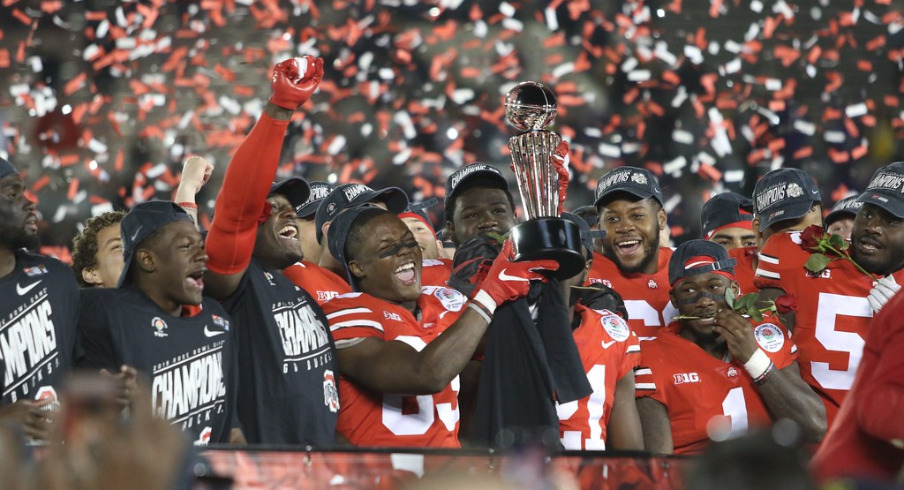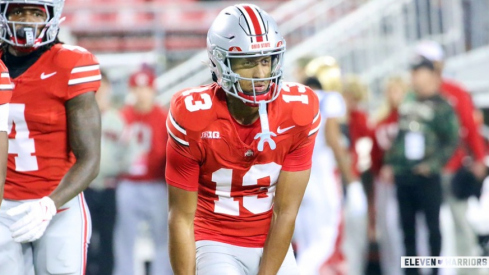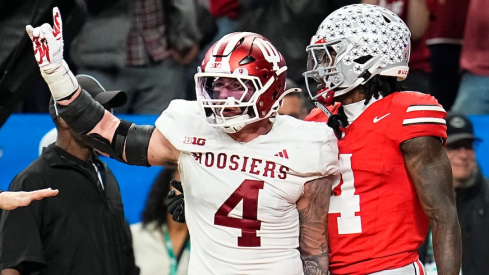Four-star linebacker Quinton Cypher commits to Ohio State.
"There's an irony that one gets paid for playing, that play should bring in money. When you sell play, that makes it hard for pure, recreational play, for play as an art, to exist. It's corrupted, it's made harder, perhaps it's brutalized, but it's still there." - Eric Nesterenko in Working, by Studs Terkel
When Nesterenko gave that quote to Terkel in the early 1970's, as part of an interview for Terkel's seminal oral history about American working life, he was on the tail end of a multi-decade hockey career that had seen him win a Stanley Cup and play over 1,000 games as a professional player.
Nesterenko believed that his place in sports existed in this undefined liminal space between the binary distinctions of fun and profit, while noting the toll that the violence inherent in his chosen sport was taking on his body. It had made him a cynic who waxed poetic about his life, the future of sports, his lack of interest in money, and what I realized as I revisited Nesterenko's — I don't know, there's probably a term for "purple prose" when it's spoken in an interview — is that he comes off like a snob who was still pretty confused about what he had spent the previous twenty years doing.
Prior to his interview with Terkel, Nesterenko was most famous for brutalizing Willie O'Ree, the first Black player in the NHL, during a game in which Nesterenko called O'Ree racial slurs and attacked him with his stick. That kind of racist abuse seems pretty straightforward to me, but for some reason Nesterenko didn't bring that up in his interview (he does add that his only regret from his career is not listening to more music).
The whole interview is weird and self-serving, with Nesterenko portraying himself as some kind of warrior-poet conflicted about the brutality of being a paid athlete or some shit and Terkel leaning all the way into that narrative.
And: I don't think it's that complicated. Work is work. Sometimes it's fun work, sometimes we've got various societal hangups about paying people to do things that we used to do on our own for free, but when your labor is generating billions of dollars for others it stand to reason that some part of that should go back to you.
Okay, that's not true. It's definitely complicated.
I'm not the right person to go into the particulars of the NCAA's settlement of their various antitrust cases, but there are several great articles by Pete Thamel, Dan Murphy, and Ross Dellenger about how this will impact the greater scope of college athletics.
Essentially, however, it paves the way for college athletes to be paid by schools while setting some flimsy guardrails in place to attempt to manage the whole thing. The potential of limiting football roster sizes, or that Title IX has only been obliquely addressed, or that the place of NIL in light of some kind of "salary cap" seems totally up in the air, are all gigantic issues that I don't particularly trust the NCAA to figure out in either a timely or sensical fashion.
And if you're a outside observer just wanting to see the Buckeyes steamroll the Hoosiers by five touchdowns on a sunny October afternoon, I can see how this all feels like an impediment to that goal. In theory college sports exists as the emotional antithesis for professional sports; as much as we as fans accept that professional athletes are doing what they do for a paycheck, the opposite side of that coin is the belief that college athletes are doing what they're doing for fun.
But, well... making a lot of money is fun. I don't say that to be pithy: getting a college degree for free, being in a video game, playing a sport as an elite athlete, and then adding fat stacks of cash on top of all of that sounds exhausting but also pretty awesome.
So a long time ago I realized that I was going to have to resolve the cognitive dissonance between how I conceptualized college sports and what the people actually involved with those sports wanted as a result of their labor. Most college athletes aren't like Nesterenko (thankfully). They're perfectly able to reconcile the difficulty of being an athlete with their enjoyment of their chosen sport, and they want to get paid for doing it.
As a fan, I deal with that knowledge by starting with a question: is being a college athlete a job? Knowing everything I know about the demands on an athlete's time and mental and physical health, the answer is a pretty obvious "yes."
That doesn't mean that the next steps will be clear or easy (or even equitable). Paying college athletes is going to be a difficult and cumbersome process that might never be completely solved. There will be necessary conversations about the scope of compensation and what form that'll take, and how that compensation might impact non-revenue sports. But the question about whether or not college athletes should be paid in addition to their scholarships is settled.
So we start there, and keep trying to make things better in the future.


